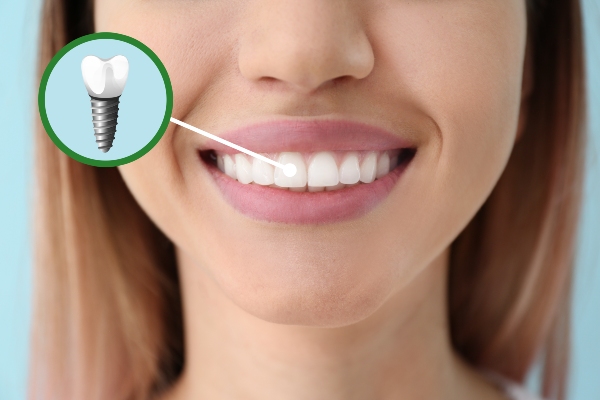 Dental implants are small, titanium screws placed into the jawbone where a tooth was removed. The implant fuses with the jawbone over time and supports a crown, bridge, or denture. This article will review six warning signs that it is time to inquire about dental implants.
Dental implants are small, titanium screws placed into the jawbone where a tooth was removed. The implant fuses with the jawbone over time and supports a crown, bridge, or denture. This article will review six warning signs that it is time to inquire about dental implants.
6 Signs You May Need Dental Implants
1. Missing tooth or teeth
Many people (adults) postpone receiving treatment after losing a tooth or teeth. Doing so harms the rest of their mouth. One missing tooth can also cause the shifting of other teeth, leading to many issues, such as malocclusions, gum disease, and jawbone deterioration. So, imagine if someone is missing multiple teeth.
2. Jawbone deterioration
Jawbone deterioration is a serious problem that can result from tooth loss or damage and gum disease. If one does not have enough teeth to support their jawbone, the bone will shrink and become malformed, causing deformities in the shape of the face. This can sometimes lead to pain, difficulty eating, and bone infection.
3. Difficulty chewing and speaking
When one is missing multiple teeth, it can make it difficult to chew properly and even alter their speech. This is because the tongue and teeth go hand-in-hand in helping patients perform these acts normally. Therefore, if teeth are missing, the tongue is without a significant amount of support, making it harder for the mouth to say certain words or letters.
When chewing food, one uses several different muscles in the mouth. These muscles move together to grind food into smaller pieces to make swallowing easier without choking or gagging. If multiple teeth are lost, these muscles need to work harder to chew food effectively as they would otherwise. This can lead to fatigue, discomfort, and pain, making many patients miss out on their favorite foods.
4. Loose full or partial dentures
If one is experiencing loose dentures or partials, this is a sign the jawbone is deteriorating. As the jawbone deteriorates, it becomes less able to support the teeth and gums. Dental implants will stabilize the area around the mouth by providing a foundation for new teeth. They also work as an anchor for newly-fitted dentures or partials, preventing further jawbone deterioration.
5. Impacted teeth or infection
Once a tooth becomes impacted or infected (and cannot be cured with prescriptions), the dentist will likely recommend removing the tooth. An impacted tooth cannot erupt into its proper position because there is not enough room in the mouth or a neighboring tooth has grown in front of it. Many people experience impacted wisdom teeth, which do not require dental implants. However, all other teeth that will cause a noticeable shift in the patient’s mouth will require a replacement.
6. Broken or severely damaged teeth
Broken teeth can cause severe pain if the tooth root is exposed and damage to the surrounding tissues and bone. In some trauma cases, broken tooth fragments can even be lodged in the gum tissue. If the dentist determines that the tooth is beyond saving after an examination, they may recommend an extraction, dental implant, and a crown. This treatment plan will restore the smile’s appearance and functionality.
Learn More Today
Dental implants are a great option for those who have lost their teeth due to trauma, illness, or aging. They are durable and can last for many years to come. If you are experiencing any of the above symptoms, contact our office and schedule a consultation today. Our team can answer any questions and determine if dental implants are most effective for you.
Request an appointment or call Martin Dentistry at 209-299-7907 for an appointment in our Stockton office.
Related Posts
Dental implants are an effective and modern way to go about replacing missing teeth. If you are missing a tooth, you are not alone in your predicament; most people lose one or more of their permanent teeth over the course of their lives. People lose teeth due to trauma to the face, aging, or oral…
Dental implants are an increasingly popular choice for individuals with missing or damaged teeth. They offer a variety of benefits over traditional dentures or bridges. However, they can also come with challenges, and not everyone will benefit from the procedure. This article will explore the pros and cons of dental implants to help you make…
Dental implants are effective, long-lasting artificial teeth. Implants are surgically attached to the jawbone to look and function like natural teeth. As a result, patients can chew, talk, and laugh without worrying about dentures slipping. They also improve oral health. This article explores when and why to get implants and the qualifying factors for treatment.Patients…


